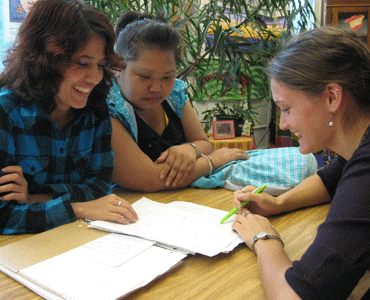Note: This article is over a year old and information contained in it may no longer be accurate. Please use the contact information in the lower-left corner to verify any information in this article.
Making a difference teaching ESL
August 31, 2010
|
|
| Rachel Wixson '10 (right) works with students at the International Academy–LEAP in St. Paul. |
As ethnic diversity in the United States has increased, so has the demand for teachers equipped to educate English language learners. St. Olaf is producing students to meet this demand through an increasingly popular summer program that includes a student-teaching experience with English language learners at two St. Paul schools.
This is the fourth summer that the two-course Teaching English as a Second Language program has been offered at St. Olaf, and enrollment more than doubled this year. This summer’s class, taught by Heather Campbell ’90, spent two weeks on campus rigorously preparing for the next three, which they spent student teaching in St. Paul’s International Academy–LEAP Academy and Phalen Lake Elementary. The class was split between the two schools, and all worked with students learning English as a second language.
LEAP has a completely immigrant student body with an age range of 14 to 21, and a majority of students are refugees. A large percentage of the students are Hmong, and others are Vietnamese, Somali, Laotian, and Karen. These students can face significant challenges when they arrive — especially those who have never been to school before (some even need to be taught how to hold a pencil). In addition, many don’t speak English at home and might be the first in their family to learn the language.
An authentic experience
The St. Olaf students already had significant field experience (for every one-semester education class a student logs 20 hours of field experience, eventually totaling 120 hours), but they agree that the ESL experience is on a different level. “This is the most authentic teaching experience I’ve had,” says Brandon Auge ’10, adding that in many other classes field experience is biweekly and often consists of tutoring. While learning to teach ESL, he and his classmates have been able to spend three full weeks working with their students, and have led classes using their own lesson plans.
The experience has made an impact on the St. Olaf students. “I did not want to work in an urban school district before I came here. Now it would probably be my preference,” Auge says. Recalling her first lesson in front of the class, Erica Bisbey ’10 says she “felt useful” right away. “You ask a question and they all shout out the answer.”
For Youa Lee ’10 the experience has been uniquely meaningful. Lee was an ESL student in the St. Paul school system who has now returned to teach in it. “It’s inspiring to come from that experience,” she says. “It’s valuable to me.”
And the Oles are committed. “If we weren’t here, they’d be losing that [ESL] instruction,” Bisbey says. “We need to equip these kids to make sure they don’t fall behind,” adds Auge. “We are trying to get them the skills they need to graduate on time.”
 |
| Campbell |
St. Olaf’s ESL education program was created by Campbell, a chemistry and science education major at St. Olaf, former ESL teacher both in the U.S. and abroad, and an 11-year veteran with St. Olaf’s federally funded Upward Bound program. Currently an assistant professor of education, Campbell was licensed in ESL education through an Associated Colleges of the Midwest program in Chicago. When that program was cancelled, she was given the opportunity to design a program for St. Olaf students to earn ESL teaching licenses.
The ESL education program will be offered once more during the summer before being moved to Interim. Campbell thinks the change will make the program more accessible, and expects enrollment to increase even further. “We need ESL teachers,” says Campbell, who notes that between 60 and 70 languages are spoken in St. Paul alone. “Even if they don’t teach ESL, teachers have to be prepared for students who are English language learners.”

